

 (The translation to English is maded by pc-program and by adding few corrects with my "know-how" :-) )
(The translation to English is maded by pc-program and by adding few corrects with my "know-how" :-) )
Information to the settlement in Western Pomerania: from 1748 at the moment Friedrich II (The Great) to this day
Hoppenwalde
Viereck
Uhlenkrug
Luisenthal
Blumenthal
Augustwalde
Information to the everyday life of our forefathers with his miseries, joys and monotony
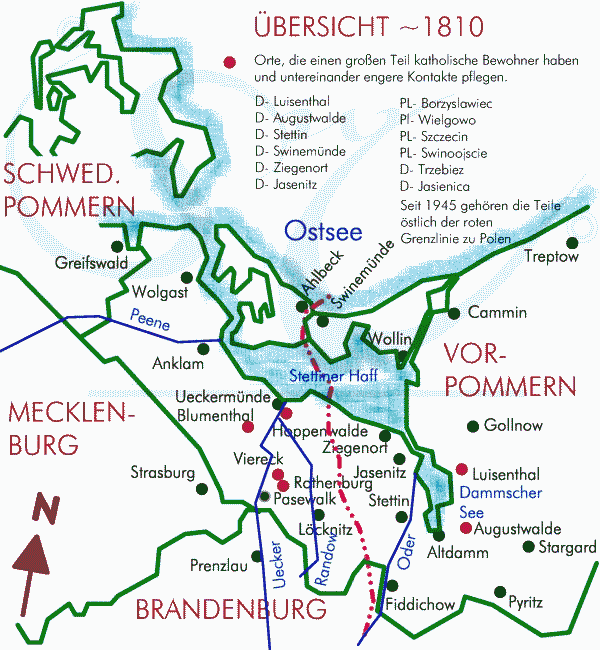
Cockchafer flies,
the father is in the war,
the mother is in the Pomeranian's land.
Pomeranian's land is burned down,
Cockchafer flies!
1740-49
War Council of Freytag recruited in Frankfurt on the Main settlers of Palatinate for colonisation of Western Pomerania (Vorpommern). Thus every third inhabitant becomes a colonist, of it most (Rhine) Palatinate in the circle Ueckermünde, E. Badstübner, in 1938, page27 [VP08]. Most are a member of the Reformed Church.
The colonists in Hoppenwalde, Viereck, (following today in Poland near D-Stettin, PL-Szczecin) to Augustwalde (PL-Wielgowo), Luisenthal (PL-Borzyslawiec) are mainly Catholics. Own catholic church registers there are for D-Blumenthal also. Before the resident population in the Rhine Palatinate in 10 years had to change ten times the denomination. Both villages Viereck and Hoppenwalde are in possession of towns.
Hoppenwalde is in possession of Ueckermünde (today to Eggesin) and Viereck is in possession of to Pasewalk (today independently). K. Haase, in 1978, page25 [VP03]
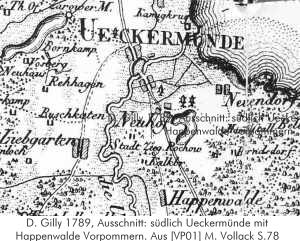 |
In the beginning the settlement was called " In the Rochow ", then to Happenwalde and from 1820 Hoppenwalde. A. Bartelt in 1926, page 244 [VP10]
Prince Moritz von Anhalt-Dessau, the fifth son of the " Old Dessauer " and right hand Friedrich II with the settlement of foreigners in Pomerania, recommended after a visit to the scene of the crime that to the south of Ueckermünde " in the Rochow " the place is suitable for it. |
The colonists have provided her villages not in own work, but they recieved buildings and court weir of the state and had to farm for it the land, and tax perform like hereditary lease, horses services and hereditary money. This changed only when they became on the 01st January, 1848 free owners of her courts.
The other families are:
Marx Joh. Nic., Schloßböckelheim
Schiefer (Schiffer) Christian, Weinheim bei Kreuznach
Schieffers (Schiffer) Johann Witwe, Weinheim
Salmon (Salomon) Jacob, Kirrweiler, Grumbach
Moche Heinrich, Seifersbach, Gräfl. Engelsbach
Hartmann Jac., Kisselbach im Trierschen
Jochem (Joachim) Wilhelm, Hachenbach, Pfalz-Zweibrücken
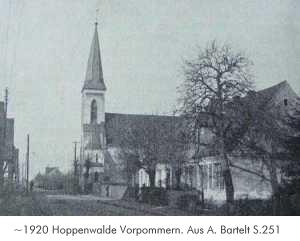 |
1808 Church inauguration in Hoppenwalde. The first catholic church in the circle Ueckermünde since the Reformation [VP01, page 348]. The church was recognized by the state only in 1859. The salary of the priest was denied mainly from the Lyons-mission fund before. The place counted as a mission in the beginning. A. Bartelt in 1926, page 253 [VP10] |
Baptisms and weddings: The deacon from Evangelic parish of Ueckermünde
Burials: The teacher in Hoppenwalde
1770: New school house and shepherd's house
1766-1849: Care of congregation of D-Stettin
1808: Inauguration of the today's church on colonist's court Nr.5
1849-60: The village get the first priest of Hoppenwalde, Joseph Gissmann
1859: Congregation is recognized by the state
About several generations one spoke in the village still dialect of Palatinate. However, about 1900 the dialect existed only in rests and about 1950 it was to be recited already tradition the Shrove Tuesday-child verse in the dialect of Pomorze like me Hildegard Engel, b. Thomas reported:
Fasselown, Fasselown innen Busch - mittn wittn Schimmel.
Jähms mi keen Speck - kümms nich innen Himmel.
Kümms inne Höll - krißt wat mit de Düwelskell !!!
A little bit modified I found this saying in [VP01] M. Vollack p.560 as a Liselotte Manthe there about Ziegenort north-east of Szczecin writes.
In Viereck said the children:
Ich bin ein armer König, gib mir nicht zu wenig!
Laß mich nicht so lange steh'n, ich muß noch ein Häuschen weiter geh'n!
Stiep, stiep, Osterei.
Gibst du mir kein Osterei,
hau' ich dir das Hemd entzwei!!!
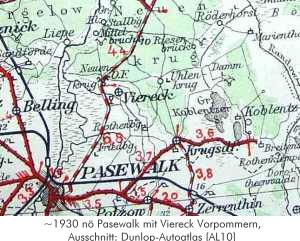 |
Viereck near Pasewalk: Here the street of Pasewalk passes on Viereck still! However, one could traveling by rail in Pasewalk in all directions. The village Viereck was called at the beginning of Jägersberg and was named in 1751 according to the state minister and protector of the Royal Society of the Sciences Adam Otte by Viereck [VP12] Ratlef, in 1740, appendix page 232. |
Dagner (Dachney, Dochney, Dachner) Wilhelm und Caspar, Alsenz, Zweibrücken
Thomas Peter, Niedermoschel, Zweibrücken
Meyer Raphael, Kirrweiler, Grumbach
Lücker Anton, Dackenheim, Kurpfalz
Petri Paul, Hundsbach, Zweibrücken
Haase Michel (Haße), Hottenbach, Kurpfalz
Salmon Christoph, Kirrweiler, Grumbach
Schück Wilhelm, Niederalben, Grumbach
Müller Johann, Bodenheim, Amt Oppenheim
After the measurement register of 1752 every colonist receives 24 Pomorze's acres (Pomorze's acres to Wikipedia: 1 land Hufe ~30 acres ~20 ha. 1 ha = 10 000 square meters = 100 ares) field. 24 acres are a 10 m wide field stripe of ~15000-m length. K. Haase p.159 attaches 40-60 acres for farmers. Herewith the colonists of Viereck belong to the half farmers who became with farther hereditary division fast Kossäten (quarter farmers), Büdner/Kätner or tenant.
There, come 16 acres meadows which are not taken into consideration with this estimate calculation.
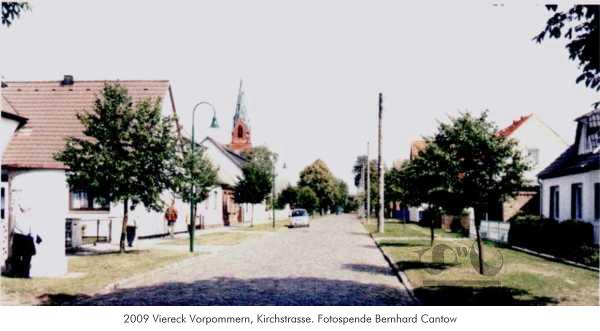
Wo früher noch der Bulle war,
erstreckt sich heut' der Boulevard.
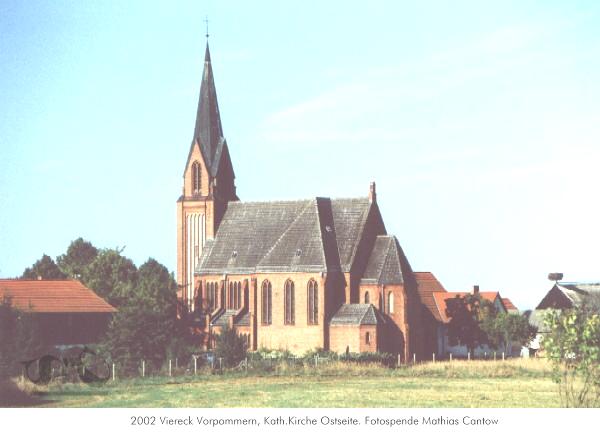
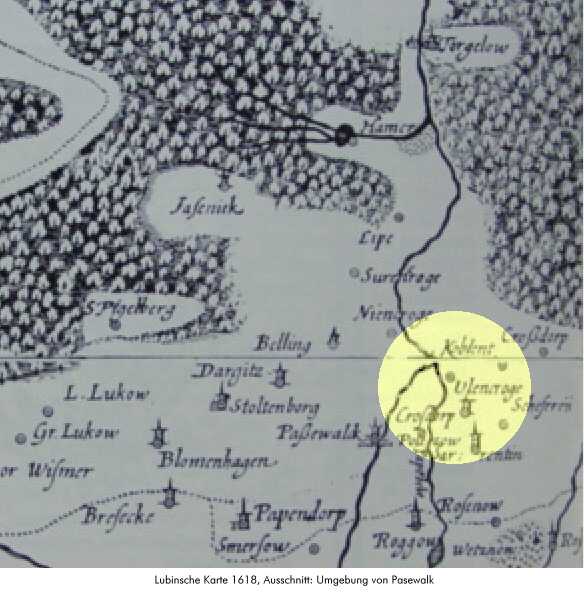
About in 1865 Uhlenkrug receives a Protestant chapel and about 1910 the municipality because of overstrain of the priest of Torgelow set aside (Probably to Koblenz near Pasewalk. The church registers of Torgelow go back to 1660. The Uhlenkrug's Catholics belonged to Viereck. According to the Pasewalker Baker's Guild p. 202 Uhlenkrug and Buchhorst is given under the district of Neuenkrug also a member of the baker's guild H. Reppin from Uhlenkrug. In this time Uhlenkrug has 166 inhabitants [AL13] Local Encyclopedia and on the measuring table sheet the settlement Buchhorst connects directly to Uhlenkrug.
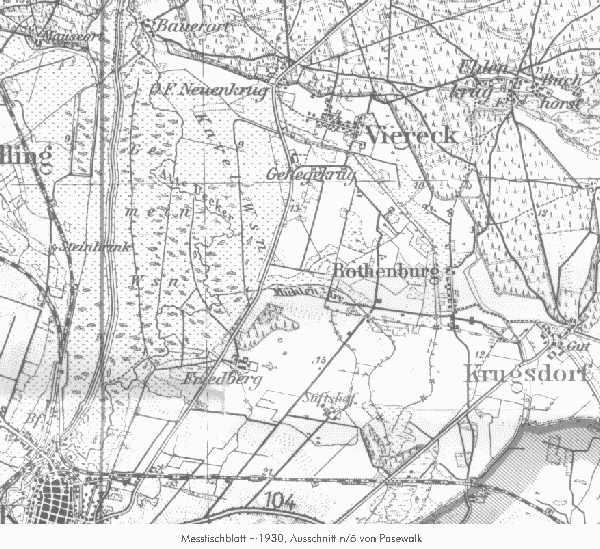
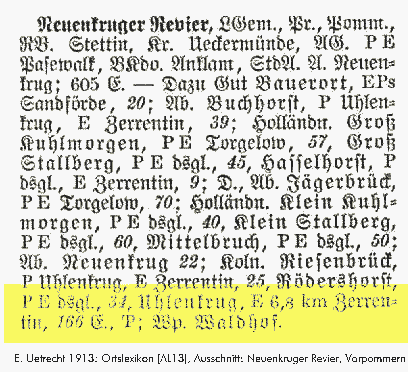
In the family tree of Christiana Wiening the Elisabeth Cantow is given on one's mother's side a daughter by "grandmother Bärwel" which dies in 1865 in Uhlenkrug and her man Wilhelm Lückert dies here in 1881. Their daughter Anna Lückert marries in 1881 in Hohenholz the Johann Rhode. Of this Hohenholz is not to be confuse with the Hohenholz in addition to castle with Penkun. Our Hohenholz lies to the north of Uhlenkrug and becomes on a map of Goltz in 1851 with Th. Of. Hohenholz (Th. Of. = calls tar kiln). Today it has disappeared of the maps and probably lies in the military restricted area. In 1777 21 royal and 54 privately owned existed in the moor of Ueckermünde. The last tar kiln was disused about 1900.
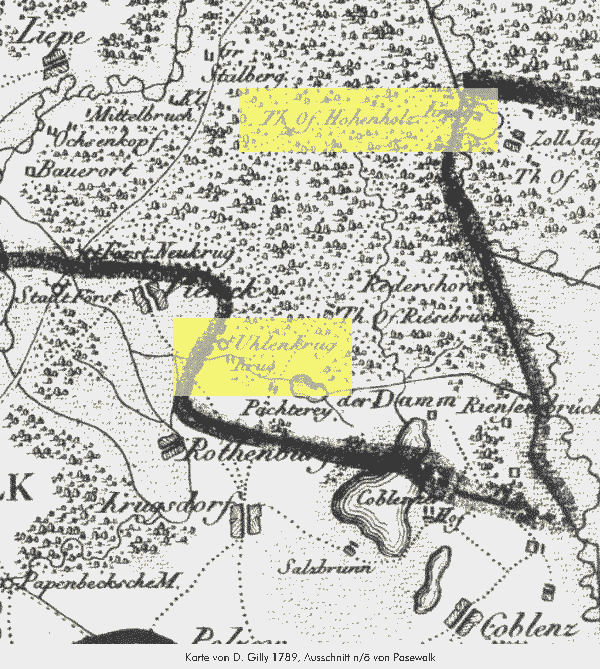
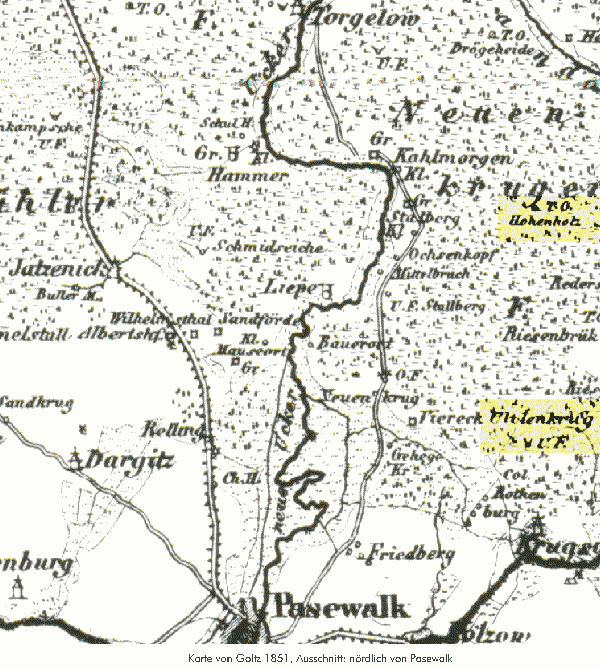
Already O. GEBHARD [VP02] complains in his preliminary remarks to the landlord's lists:
" The family names are such disfigured in the actions often.... The definite statement of the places of origin is even more difficultly often ... ". I can only agree with him there, because in my present case to ROHDE and ZILM these both names are not to be found in his landlord's lists. In [VP31] Domänenkammer in 1752, I found by chance a Carl RHODE (see point 6 below) and a ZILM is given neither in [VP02] nor in [VP31], but in [VP31] is for Kerstenwalde in the District Friedrichswalde (east of Szczecin, today Poland) Mich. ZIEM (from Poland) taken down. These ZIEM could be my wanted ZILM ! While I could localize the village Barenbruch southeast from Augustwalde, my fixing of Kerstenwalde has missed. Probably it has been renamed or ...!?
If somebody is interested in ancestors and descendants with RHODE, here my findings:
1. RODE Hermann in 1896, in a list of the house fathers in Viereck/ Neuenkrug. He fits very well in the forefather row!
The other names than possible ancestors or descendants from him:
2. ROHE Joseph ~1920-1944 WWII, on the fallen board in the church of Viereck. (No connection to Rhode ! Information from Berhard Cantow Febr. 2013)
3. RODE Christoph 1743, in 1743 who has leased the Ahlbecker sea with others, drained later from Winckelmann, in the moor of Ueckermünde.
4. ROHDE Reinhold writes in [VP01] M.Vollack S.120 an article ~1980 " The forestry ".
5. ROHDE Richard 1933, taxi in Ziegenort [VP01 p.231, 558.
6. ROHDE Carl ~1754, as colonists "candidate" (Mecklenburg half farmer from Swedish Pomorze) for Barenbruch, District Friedrichswalde, (name of open fields: Bärenbruch) southeast from Augustwalde.
Of this Friedrichswalde is not to be confuse with colonist's place Friedrichswalde in the District Grimnitz in the Kurmark.
With my forefathers in Viereck it was still sung in the children's song:
"Vadda fährt no Uhlawald (Uhlenkrug),
hehlt uns Eppel un Kerscha.
Heita, morja un die ganze Wocha henn mehr nix zu Kocha ..."
This text could still come from the first colonist's years in Viereck when own fruit-trees were only freshly planted, and one longed for own harvest!?
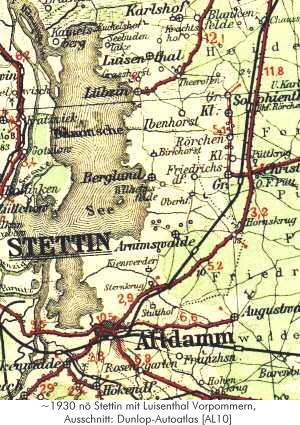 |
From [AL10] Dunlop-street map, Hanau ~1935, p.24: Luisenthal (PL-Borzyslawiec) to the north-east of Stettin. The accompanying removal Jagenkamp is directly southeast from Luisenthal, with Konow on the plan-page 200. To Augustwalde (PL-Wielgowo) lies to the east of Altdamm. |
Basically after the film of the Mormons (film FHL INTL 544873) which have had a look Margitta Gundacker and Willi Vetter-Gundacker thoroughly "to the eyes watered", because the written-expert church man has to judge by his manuscript, no consideration for it taken that generations might still read these recordings after him!
I found further forefather researchers to Luisenthal with:
1. On homepage at Margaret Galus Sandlier, USA (and thanks Pawel Bandur, PL-Szczecin): Johann Wilhelm THOMAS ~*1816 in Hoppenwalde oo1835 in Luisenthal die Maria Carolina SENFT.
2. RootsWeb (Thanks Detlef Petry ):
a) Johann Franz Petri, Bauer +1839 in Luisenthal, *1781
oo 20.09.1809 Maria Carolina Hartmann in Viereck, *28.02.1789 in Viereck
b) Johann Valentin Petri, Zimmermann +nach 1835 in Luisenthal, *1786
oo 22.10.1817 Maria Clara Catherine Hartmann in Viereck, *26.02.1796 in Viereck
Baron August Heinrich of Borgstede from Rörchen was placed at disposal the land [VP09]. Borgstede worked as royal officials, became in 1823 a member of the council of state (against which certificate the monarches no law to push through dared) and died in 1824. The family had her residence in Rörchen till 1945.
Maybe one finds in court records (e.g., land register) one more Luisenthaler index of names of 1809?
In 1827 are with F. von Restorff for Luisenthal 146 kath. Inhabitant given.
Luisenthal is in 1865 as a Catholic Congregation Center, also for the dispersed Catholics in the environs.
In 1867 a total of 427 inhabitants, from it 227 Catholics and 100 live in Luisenthal in the accompanying removal Jagenkamp, see K.-O. Konow page 42..
The neo-Gothic church illustrated below stands even today and is in a good state. It was built after 1900 and substitutes for the framework church of 1865.
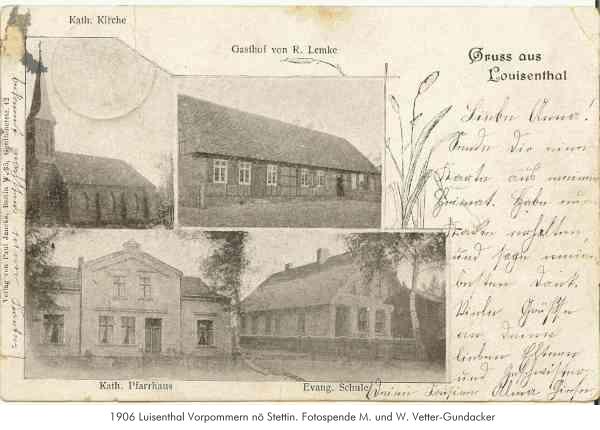
More Links to Louisenthal:
1. Stettin with surroundings about 1914: in the Stettiner church registers the places Bredow, Grünhof, Zülchow ... are also mentioned for the tightened Cantow's from Viereck, Hoppenwalde, Luisenthal .... They are in the north of Stettin. On the right the Dammsche sea.
2. Around 2005: Louisenthal als Borzyslawiec in Poland today
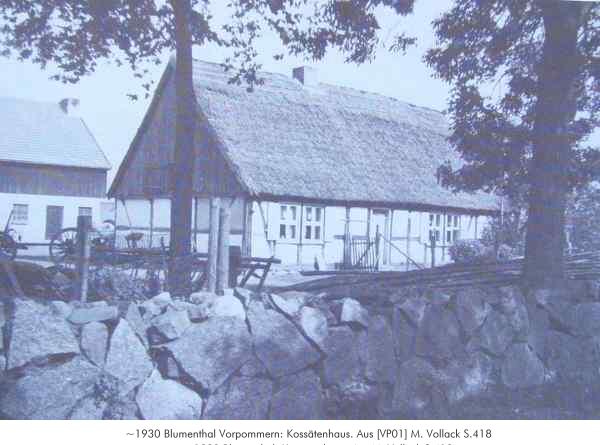
More Links to Blumenthal:
1. Here later there is also a Catholic church with church register. Externally the first church corresponds to the farmhouse illustrated below. Merely inside there are a pray room with next school room and teacher apartment (photo donation Bernhard Cantow, Viereck).
2. Map cutting of the measuring table sheet.
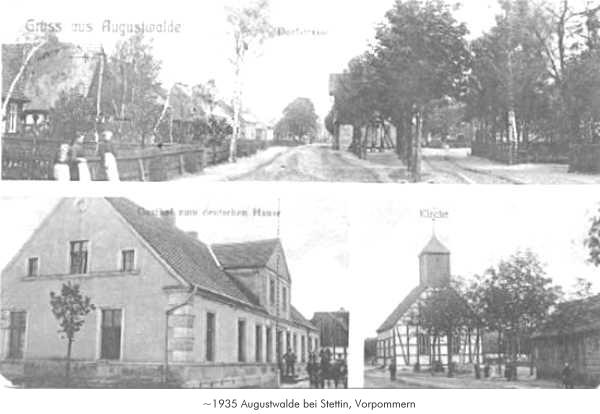
The first colonists of D-Augustwalde, PL-Wielgowo (at the beginning of Felchow, " In the Sow Garden") are:
Catholics: Chor (Kuhrt, Koor), Johann, Klein, Marx (4x), Otto, Schmidt, Senft, Wingert
Lutherans: Gebhard, Grell (Krell), Hartmuth, Schneider
Reforms: Beyer, Eberle, Geist, Gesell, Graf, Halter, Hilberling, Kirschbaum, Müller, Schuster, Spohn, Steinert, Wagner.
Augustwalde the biggest Palatinate's settlement is in Pomorze, after Bastian [VP09] page 10. Seven years after the settlement 17 of 30 farmsteads had changed in 1754 already the owners. In Viereck a Peter Senft from Augustwalde was resident in 1768, before he had taken over in 1754 in Hoppenwalde the farm from Hartmann. Concrete marriages of Viereck after Augustwalde are not known to me from the first decades.
In 1752 there is controversy between the Lutherans (school master Gebhard) and the Catholics (Marx, Wingerth) around the rooms in the school house. With it the latter consulted in a letter directly to the King. Bernhard Cantow from Viereck has got to decipher the manuscript, so that we can something hear about the contents.
After [VP30] 1940, Nr.6 the teacher Splinter describes some specific features for the farm village to Augustwalde on the road to Stettin's suburb settlement. In this time it burned in the place very often. From in 1887-1921 133 buildings were thereby destroyed, then the construction boom started (mainly 1920-27) and still about 1940 new buildings come into being per annum 60-80 in Augustwalde. At this time the old reed roof half-timbered houses stood only with the farmers Rohde, Fick and Marx.
More Links to Augustwalde:
1. Augustwalde 1937: Plan of village.
Or look >>> here (132kb) about your browser for the first colonist's names or colonist's places; here you also find a small collection (without claim to completeness!) to the different manners of writing of the names which have arisen all the time.
The time since the settlement is well documented in the archives, because, on the one hand, Frederick II took care personally of it (he hoped for to more taxes) and to the other the families CANTOW in the places Hoppenwalde and Viereck to this day are native and can be well postpursued therefore in the church registers.
However, not a few had to seize in her new native country once more the traveling stick. There it went in all directions in Germany, to America (USA), and Canada... For America emigrants one can become successful, e.g., in the Internet or in the ship lists "Germans to America". [AL04]
With the hands was played with my parents in merry table round still...: " We go to America, and who wants to go?? The cat with the long tail, and it has to go!!! "
The colonists of Viereck complained, in addition, about peaty ground and frequent floods, so that they maked it that her hereditary lease of 20 talers on 10 talers was lowered.
Over here there is from the first colonist's years till 19th century extensive correspondence. Teacher Hans Tornow found the originals in 1952 in the school of Stallberg on the attic.
Nowadays the whereabouts of the originals is not known to me. Bernhard Cantow owns copies in Viereck.
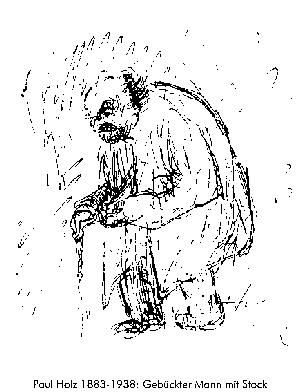 |
The draftsman Paul Holz had also a look for the people in his environs. Borned in 1883 in Riesenbrück, not far from Viereck. In 1920 Stettin In 1925 Breslau dies in 1938 in Schleswig [VP17]
I could sign always only, |
The town Ueckermünde already pursued before the 30-year-old war in the Rochow II a brickyard. In 1864 there were in Hoppenwalde already four brickyards, linked with increased move of workers, so that also a Protestant church was built.
In 1884 the line Jatznick - Ueckermünde becomes finished, with stop in Hoppenwalde.
Theodor Fontane describes in the Oderland, in 1879 page 26, 48 segment 4: [VP16]
The colonisation and the colonists
In the Odermarsh around Neubarnim the colonists had better ground than in Viereck. Wildly and fish there was in the abundance. Thus it gained even prosperity and one put maidens and farmhands. These put out with her employers to get not more often than twice weekly roast hare.
Fontane deplores, the immorality of the colonists, because they have become too fast rich:
It too lightly to you in the shooting,
" Be too happy " was your lot.
How is the saying called in the goldnen book?
"Wealth is blessings, and wealth is a curse"